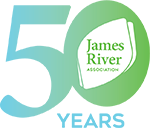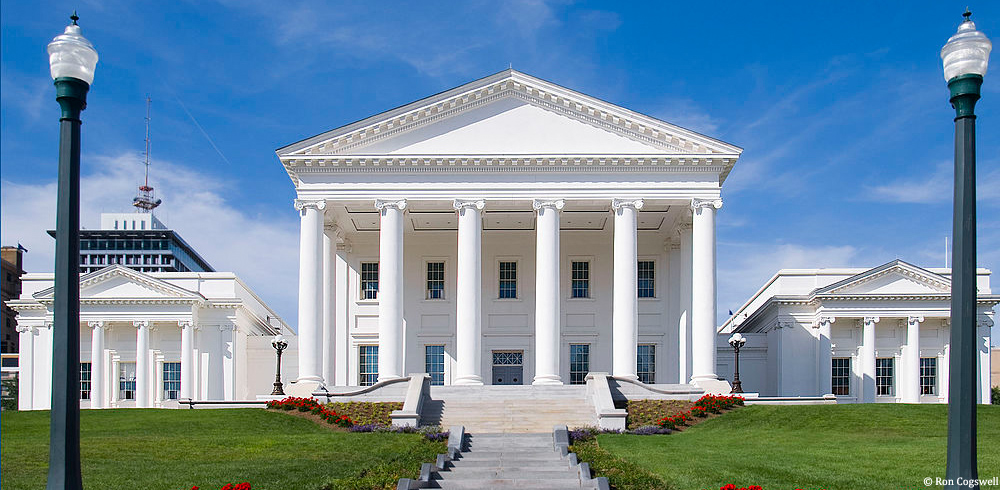Across the Commonwealth and across the aisle, Virginians value clean water and healthy rivers. The James River supports thriving industries, from family farms and working forests to local tourism and outdoor recreation businesses, and it delivers clean drinking water to 2.7 million Virginians.
Virginia’s Chesapeake Bay cleanup plan includes practices that will improve the health of our rivers and streams. But we need strong state funding and policies to put those practices in place before the 2025 deadline. To restore the Bay, and our rivers, we urge our state leaders to support our 2023 James River Agenda.
Clean Water and Conservation Funding
The 2023-2024 Budget includes historic levels of funding that will be transformative for Virginia’s natural resources, including its rivers and streams. But we’re still not on pace to reach our Chesapeake Bay restoration goals on time. The General Assembly can deliver on long-standing, bipartisan goals for cleaner water and healthy natural landscapes in Fiscal Year 2024 by including a total of
- $137 million for the Virginia Agricultural Cost-Share Program to fully fund the program and help farmers protect their local streams through conservation practices.
- $237 million wastewater treatment upgrades to fulfill the requirements of the Enhanced Nutrient Reduction Certainty Program;
- $80 million per year for the Stormwater Local Assistance Fund to help communities reduce runoff pollution and prevent flooding;
- $100 million to end polluted overflows from Richmond’s combined sewer system;
- $2 million in FY2024 to improve Harrison Lake Fish Hatchery and increase its capacity for freshwater mussel restoration;
- At least $200 million equitable distributed across the Resilient Virginia Revolving Loan Fund and the Community Flood Preparedness Fund for resiliency planning and projects across the Commonwealth;
- As well as full funding for multi-use trails and land conservation, including farmland, battlefields, and lands and cultural sites significant to BIPOC communities and Virginia tribes.
Keep Virginia’s Commitment to the Chesapeake Bay Cleanup
In 2020, Virginia fulfilled an important policy pledge in its Chesapeake Bay Cleanup Plan by passing backstop legislation that encourages faster voluntary implementation of agricultural best management practices. That legislation would make certain cost-effective practices mandatory should we fail to meet our agriculture pollution reduction goals on-time through voluntary means. Attempts to delay this legislative backstop by five or more years would send the wrong message to Virginia’s agricultural community at the wrong time. We need to make as much progress as we can between now and the 2025 Bay Cleanup deadline, and we need to make the best use of the unprecedented funding currently available for agricultural practices.
- Maintain Virginia’s agricultural backstop law, which makes certain critically important conservation practices mandatory by a meaningful date if we fail to meet our commitments voluntarily. Avoid overly long delays that discourage farmers from accessing currently available resources.
- Support new grant incentives that, in addition to Virginia’s Agriculture Cost-Share Program, accelerate adoption of cost-effective agricultural best management practices
Protect communities and the environment from harmful PAH pavement sealants
Polycyclic aromatic hydrocarbons are carcinogenic compounds that are harmful to our health and the health of wildlife and waterways. Driveway, parking lot, and other pavement sealants that contain high levels of PAHs can expose nearby households, rivers, and creeks to these dangerous compounds. Studies show that prohibiting the use of sealants with high PAH levels in favor of more cost effective alternatives is an effective way of lowering PAH concentrations.
- Pass legislation that gives localities the authority to limit or ban the use of pavement sealants containing high levels of PAH.
Improving Virginia’s Resilience to a Changing Climate
Our 2021 State of James report shows that climate change will increasingly impact the health of our waterways and the communities that rely on them to thrive. Virginia has taken much-needed action to address the impacts that climate change is already having on our Commonwealth. This includes joining the Regional Greenhouse Gas Initiative, using it to fund the Community Flood Preparedness Fund, and drafting our first Coastal Resiliency Master Plan. We have also prioritized the protection of our wetlands and the use of living shorelines to address the threats of rising sea levels. We should maintain this progress and provide adequate support to the state agencies hard at work helping localities throughout the commonwealth prepare for the impacts of hotter temperatures and wetter weather.
- Reject efforts to rollback Virginia’s climate initiatives protections that will make us more vulnerable to higher temperatures and flooding.
- Continue to prioritize the use of living shorelines where the best available science shows that they are suitable for protecting and managing our shorelines.
- Provide adequate support for agency staff to assist localities in resilience preparation.
For questions and additional information, please contact Tom Dunlap, James RIVERKEEPER, at tdunlap@thejamesriver.org
As the General Assembly prepares to take up the 2023-2024 State Budget, we have the opportunity to make this the biggest investment in clean water that we’ve ever seen! And you can help by making sure your representatives know how important clean water is to you.

